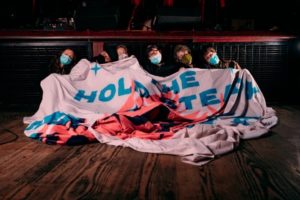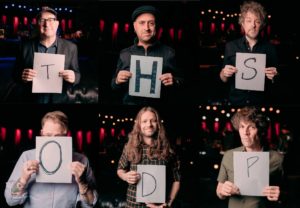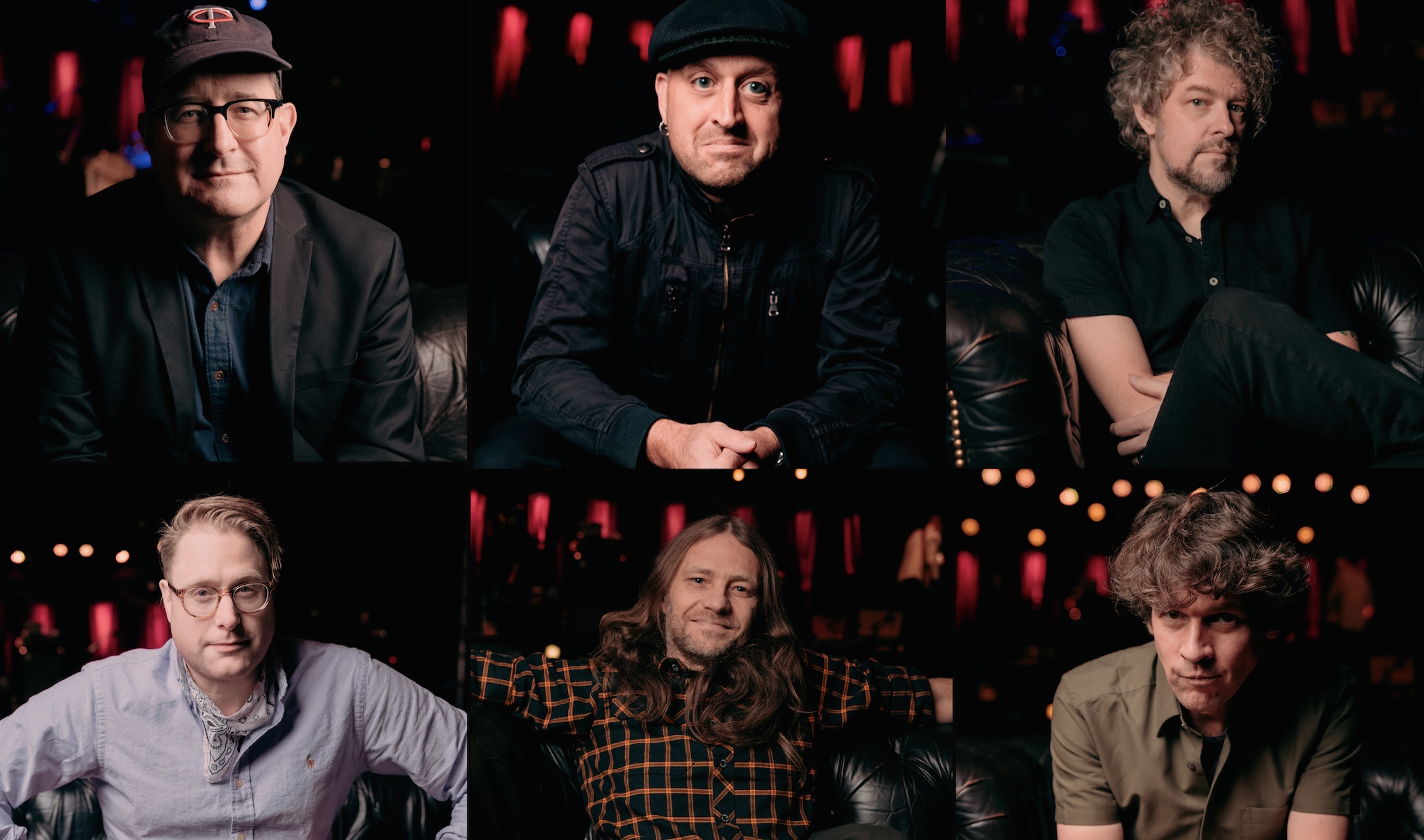The Hold Steady not only abides, but thrives in 2021. After their big comeback with 2019’s Thrashing Thru the Passion, the Brooklyn-based six-piece kick open the barroom doors with the more cohesive and adventurous Open Door Policy. They hit a bit of a mid-career rough patch from 2010’s Heaven Is Whatever to 2014’s Teeth Dreams, but piano man Franz Nicolay is back on the stool and surrounded by old Hold Steady friends Craig Finn (vocals, guitar), Tad Kubler (lead guitar), Galen Polivka (bass), Bobby Drake (drums), and new guitarist Steve Selvidge. They all seem to be brimming with ideas and contributing those to the band’s ever-growing Dropbox folder.
Open Door Policy was written and mostly recorded before the pandemic hit U.S. shores, but the songs grapple with ever-current issues such as mental health, group power dynamics, and emotional endurance. The characters on these ten new songs also find themselves not just at music festivals, bars, and seedy joints across America—the drug-laced environments of the past are intertwined with hospitals (“Lanyards”), a mansion on the mountaintop with cult vibes (“The Feelers”), and a hotel room set up as a party zone (“Riptown”). There’s also a menacing barroom song that casts a dingy light on damaged lovers meeting again “on the corner by Central Smoke and Gift,” and they just want to see “where this goes.” A quintessential Hold Steady setup.
In a similar way, a live band together since 2003 just wants to keep experimenting with expectations while in quarantine, free of any previous constraints and eventually perform again for their dedicated fanbase. That’s a pretty heavy covenant right there.
Does it feel odd to release a record in this environment and not immediately be going on tour and getting ready for another festival season?
Craig Finn: Yeah. I mean, the record probably could have come out earlier. The last recording session was in December of 2019, but we thought, “Well, let’s figure out when we can play shows around this.” It was last April and May, there was still some hope for September, you know, and as those dreams obviously changed we thought, “Let’s just put this thing out.” We’ve resigned to that reality, but at the same time, everyone’s in the same boat and we’re able to do those shows in December. We were able to do these live stream shows from the Brooklyn Bowl this past December, and it felt cool to play new songs. So again, there’s all these small victories.
Was Open Door Policy more of a collection of songs that you worked on in one go, or were some kicking around for a while, like some of the tracks on Thrashing Thru the Passion? It sounds more cohesive to me overall.
Finn: So the singles came out as we recorded them for most of it, and then we kinda said, “Let’s hold these back and see if we can make an album.” I think one of the fun things for us is that we’re able to kind of condense things as a surprise a little bit—we’ve got a fanbase and we’re able to say, like, “Hey, we got a new song!” In this case, we’ve got a new album, but also I think when you’re writing songs just to release one at a time, you’re always kind of swinging for the fences. There’s something about making an album where you can be like, “Well, what are the winners?”
Overall, the process of writing and recording [the new songs] wasn’t all that different from Thrashing. For Open Door Policy, we would go in with four to six songs every couple of months and play them out. Both this record and the last record we were geographically a little separated, so there is a little more technology and Dropbox file sharing kind of thing happening than there has been previously. There’s also a little more homework maybe done before you get in the space.
“One of the nice things, as far as writing remotely like this, is that you get a little more chance to illustrate your proof of concepts on a song. If you have an idea and how you think it might sound, it’s a lot easier to present it in a more demo-style fashion sometimes.” —Craig Finn
Are there one or two elements thrown out to the group, and then people kind of go to their separate corners and work on what they think they can contribute?
Finn: Somebody will send some music and I’ll write lyrics, but maybe that’s like two parts. Maybe when we get in the space, someone might say, “I have an idea for a bridge there.” We’re not starting at zero—which is good because of the band geography now, but also for a band at our age. One of the nice things, I would say, as far as writing remotely like this, is that you get a little more chance to illustrate your proof of concepts on a song. If you have an idea and how you think it might sound, it’s a lot easier to present it in a more demo-style fashion sometimes.
Franz Nicolay: And it’s great to just be like, “Here’s the one, I think this should be the piano part.” You can get past that barrier of articulating the idea.
You recorded Open Door Policy at the Clubhouse in upstate NY. Is this your first time recording there?
Finn: I had recorded a record [2017’s We All Want the Same Things] with Josh Kaufman up there. This is the first Hold Steady recorded there.
Nicolay: We had a little bit bigger band, so we wanted the space. You can stay there and get a big room with this nice piano, so that’s helpful. So, yeah, it’s actually been great, it really worked out well, especially when the weather’s nice, ’cause it’s kind of a beautiful place to hang out. I’m a big fan of working at residential studios. If you can just sort of sleep there and stay short term, you can really focus as a band. A lot of us are in New York, too. It’s just far enough out that you’re almost somewhere else.

You’ve worked quite a few times with Josh Kaufman. What do you think he contributes to your projects?
Finn: I like that Josh’s instincts are not hard rock. He’s kind of, I wouldn’t say skeptical, but I don’t know. He’s there to go in a different way and that kind of gets some questions that help. I also just think he’s generally a fun person, and the sessions are fun. I think generally when The Hold Steady is having fun good things come out of it.
For the new record, I like that there wasn’t an immediate rush for getting to the big riff.
Finn: It’s hard to remember looking back and wondering if it was Josh’s idea or one we came up with ourselves? I think you’re right. I think one of the things that defines the sound of this new record, and some of the other ones, is just the layering of the different musical elements and the different players. There’s been a progression from the beginning of the band to this stage.
I’m always struck by what songs you guys choose as your opening tracks, and the expansive quality of “The Feelers” was a favorite of mine because it’s so different. What’s the background for that track?
Finn: Some of our records kind of come out swinging—the last one did with “Denver Haircut.” So I was thinking it might be good to be creeping in a little bit. Franz started the music for “The Feelers” and I loved it and it sort of felt like it really was a story-forward song. When we got in the studio, there’s that break kind of halfway through, but I sort of think of that as a David Gilmour/Pink Floyd kind of guitar line. I thought, “Oh, that’s an opener.” It just reminded me of being stoned in a dorm room.
“I think generally when The Hold Steady is having fun good things come out of it.” —Craig Finn
Was there ever a time where you decided to shrug off your own expectations?
Finn: I think when we were together in December we figured out we have, like, 119 songs, roughly. So in that sense, I don’t know that we feel a pressure right now, like the catalog is established. I don’t feel a lot of pressure or nervousness about what we’re going to add to it. Other than if we like it, this is just a collection of songs that we happened to write that year. It’s where our heads were at.
When touring eventually starts to open back up, will you go back to more of the residency style?
Finn: I would think that we would, because I think the residency thing is what works for us and it makes sense. I’m curious to see, post-pandemic, if a lot of other bands start adopting the same model, because I wouldn’t be surprised in some ways. It’s just sort of a more reasonable way to attack it than to drive around for six months at a time and try to shoehorn yourself into a small Midwestern city on a Monday night.
Going back to Open Door Policy—and “Riptown,” specifically, toward the back half of the record. Tell me a bit more about the creation and inspiration behind the lyrics for that one, Craig, and some of the things that you’re hoping to communicate.
Finn: That was one that came up in the studio. We had that big riff and were piecing it together from there. That was just sort of like a fast-talking kind of thing, you know. Rip Town was a friend of mine who has sometimes played with us. He’s always talking about setting up for a “Rip Zone,” which is where he’s going to party in a hotel room. “Come on down to room 103, we’ve got a Rip Zone set up.” So it’s kind of laughing about that in my mind, but that’s a classic song where you start talking fast and see what comes out. Sometimes it’s funny.
There’s kind of a lineage for comedy or inside jokes within classic rock jams.
Finn: I always said that a lot of the best rock—and there are exceptions—is funny in some ways, from Chuck Berry and Bruce Springsteen to whatever. If you start out by trying to amuse yourself, it’s usually a good place to start. Like that’s a basic social bonding thing with your friend, or you’re seeing an inside joke that creates its own technology, creating intimacy.
I’ve always really enjoyed the album covers you’ve put out so far since they typically evoke the feeling of the record. For the Open Door Policy cover, it kind of has that laundromat photograph and the mailbox lettering. Where was that taken?
Finn: I was working with his guy Vance [Wellenstein]. I saw that on Instagram and we were working on something else for the cover and we were getting really frustrated. We tried a million things but I kept thinking about that photo, and there’s something about a lot of the records that have to deal with mental health. I thought about that sort of double exposure. There’s a lot of things happening back in the window as sort of feeling like fractured mental health, a little bit to me.
But that photo is straight off Instagram. I found it by a guy who sent me a direct message, which I rarely look at. He said if you like any of my photos, you should use one for an album cover. I happened to look at it and I sat on that and then it sat with me for a few months. He’s in Australia, so that’s somewhere in Perth.

Who did the artwork for the singles for this record? They kind of have a similar style and vibe with the animals.
Finn: That kind of came out of the idea that pretty much every song mentioned an animal, so we kind of created this idea of stickers. They kind of look like something you might see in a children’s activity book.
Franz, I’m sure by now you’re fully transitioned back to the band as it stands now. How is that going?
Nicolay: At this point I’ve been back in the band as long as I was in originally, so to talk about transition at this point doesn’t really feel accurate. I think this is the best version of the band. It’s amazing to play with Steve [Selvidge]. Everybody’s found their pocket in the sound, and everybody’s contributing to songwriting, and it’s just super fun and relaxing.
“I think this is the best version of the band. Everybody’s found their pocket in the sound, and everybody’s contributing to songwriting, and it’s just super fun and relaxing.” —Franz Nicolay
For this record, do you have any favorites tracks? You definitely have plenty of time to shine for the keys and all that.
Nicolay: The song I kept coming back to was “Lanyards.” It gives me chills every time I hear it, and the song was recorded really quickly in the studio. We had demoed it on Dropbox. We played it as a band and assembled the arrangement in the studio and basically had finished it by the end of the day. And there’s virtually nothing for “Lanyards” that you’d hear on the record that wasn’t done in a day—I think there was just a little bit of background vocals. And I think that’s an example of one of those songs where there’s a bunch of different parts going on that also weave together in a way that really works.
What’s next for you guys other than promotion for the album? Any other live streams coming up?
Nicolay: We rescheduled all of last year’s residencies to this year. So fingers crossed, and looking to see what’s going to survive. I would imagine if things can’t be done in person, we’ll try to do more live streams. And the writing process hasn’t stopped. We have a bunch more songs in various states of completion in our Dropbox folder. It reminded me that the songs were sitting around for fourteen months before we could release them and how frustrating it is to just re-record the thing and put it out anyway. At this point, I’m excited about the next round. FL







